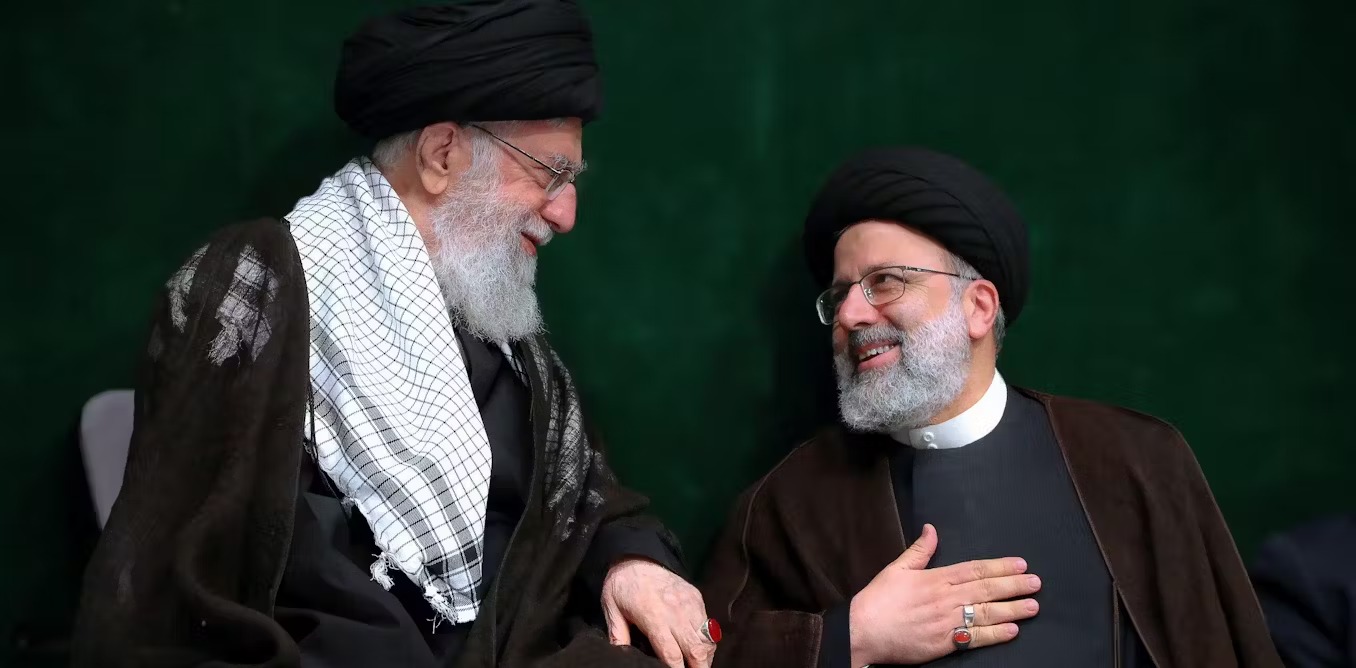The death in a helicopter crash of the Iranian president, Ebrahim Raisi, on May 19 has triggered a presidential election one year earlier than expected. It’s a consequential moment in Iranian politics as many believed that Raisi was being groomed to take over as supreme leader on the death of Ayatollah Ali Khamenei, who is 85.
The constitution states that an election must be held within 50 days of a president’s death in office. So the election, which was originally scheduled for June 2025, will take place on June 28 this year. When registrations closed on June 3, 80 candidates had come forward – including, for the first time, a small number of women.
This long list tells us that, at this point, the supreme leader’s office and its allies are keeping their options open on how to manage this election. The regime is in a difficult position. It wants to ensure that, as with the late president Ebrahim Raisi, it has a successor who will dutifully follow Ayatollah Ali Khamenei’s directions.
However, the regime needs a shroud of legitimacy. Having suppressed public expression since the mass protests after the disputed presidential election of 2009, it is enduring the lowest turnouts in the history of the Islamic Republic. Only 48.5% of eligible voters turned out for the 2021 presidential election and even fewer – 41% – in the parliamentary elections this year.
Among the candidates is Mohammad Bagher Ghalibaf, the parliamentary speaker and former head of the Revolutionary Guards. He has registered, despite failing in three previous campaigns and in the face of opposition from hardline figures in the regime.
Other prominent candidates include Ali Larijani — a former parliamentary speaker who was disqualified by the Guardian Council 2021 to ensure a clear path for eventual “winner” Ebrahim Raisi.
From the more moderate wing of the political spectrum, Eshaq Jahangiri, who was the first vice-president in the government of reformist president Hassan Rouhani from 2013 to 2021, and centrist Abbas Akhoundi, another minister in Rouhani’s government, have also applied to be candidates.
From the hardline conservative end of the spectrum, Mahmoud Ahmadinejad – who was president from 2005 to 2013 – has also registered. But it is likely that the regime, which disqualified him in 2021, will do so again, given the tension between Khamenei and Ahmadinejad during his second four-year term.
Saeed Jalili is likely to be a favourite of many hardliners. A former lead Iranian nuclear negotiator, he is now a fervent opponent of any interaction with the US. He’ll talk tough about Iran’s international position and about the crackdown on women’s rights and the enforcement of compulsory hijab at home.
But most of the 80 candidates whose applications have advanced are across a range beyond the “hardline”. Ghalibaf, a former mayor of Tehran, is more of a traditional conservative or “principlist”. Larijani, also a principlist rather than a hardliner, may attract centrist support. And Jahangiri is there as a representative for the reformists.
What matters is whom the Guardian Council decides is an “appropriate” candidate. The 12 members — six clerics named by the supreme leader, and six jurists named by the parliament — have consummate veto power. Their decisions on disqualification cannot be appealed.
In 2013 the supreme leader’s office – and thus the Guardian Council – miscalculated. The council disqualified two-term former president Hashemi Rafsanjani, seeing him as a threat to the regime’s crackdown on dissent. As a consolation, it allowed Rafsanjani’s protégé Rouhani to run, thinking he had no hope. But when the three conservative candidates approved by the council split the vote of the bloc, Rouhani won a first-round majority.
In 2021, the Council avoided that error by not only disqualifying prominent centrists and reformists, but also by removing conservatives — such as Larijani and Ahmadinejad — who might take votes from Raisi.
They could pursue the same tactic this time. But the risk is that, by denying any apparent choice to voters, they depress the turnout.
Breakthrough for women?
The advance of applications by four women – notably hardline former MP, Zohreh Elahian – poses a historic question for the Guardian Council. Until now, the Council has disqualified all female applicants on the grounds that candidates must be from among political or religious rijal – which has tradiitonally been interpreted narrowly to mean “men in politics”.
But some constitutional experts and politicians have interpreted rijal to mean “figures” or “persons” irrespective of gender. And Elahian is a fierce supporter of the compulsory hijab – so fierce that she has been sanctioned by Canada for endorsing the death penalty for participants in the recent “woman, life, freedom” protests.
Under pressure from those protests, spurred by the death in police custody of Mahsa Amini – detained and beaten for “inappropriate attire” – the regime may decide to allow the “right” type of woman to run.
How the early election will affect the political dynamic in Iran remains unclear. The supreme leader, who is 85 and without a clear successor, called Raisi a “devoted servant” and he would like the same in a successor.
Jalili will undoubtedly be running, probably as a favoured hardliner. But will both Ghalibaf and Larijani be blocked, or will one — even both — be permitted to stand to ensure the semblance of a contest? Will that facade also include a prominent reformist such as Jahangiri?
And an even bigger question is whether the regime’s chosen tactic work with an Iranian population, most of whom have been ground down by 15 years of political turbulence and repression. The regime must tread a careful line between controlling the election and risking its legitimacy in an election where few people bother to turn out.



 Ghislaine Maxwell to Invoke Fifth Amendment at House Oversight Committee Deposition
Ghislaine Maxwell to Invoke Fifth Amendment at House Oversight Committee Deposition  Trump Congratulates Japan’s First Female Prime Minister Sanae Takaichi After Historic Election Victory
Trump Congratulates Japan’s First Female Prime Minister Sanae Takaichi After Historic Election Victory  Israel Approves West Bank Measures Expanding Settler Land Access
Israel Approves West Bank Measures Expanding Settler Land Access  Japan Election 2026: Sanae Takaichi Poised for Landslide Win Despite Record Snowfall
Japan Election 2026: Sanae Takaichi Poised for Landslide Win Despite Record Snowfall  China Overturns Death Sentence of Canadian Robert Schellenberg, Signaling Thaw in Canada-China Relations
China Overturns Death Sentence of Canadian Robert Schellenberg, Signaling Thaw in Canada-China Relations  Trump Lifts 25% Tariff on Indian Goods in Strategic U.S.–India Trade and Energy Deal
Trump Lifts 25% Tariff on Indian Goods in Strategic U.S.–India Trade and Energy Deal 
































